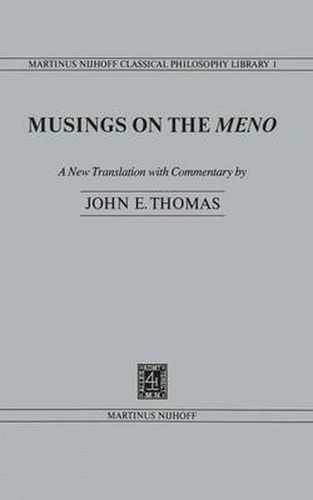Readings Newsletter
Become a Readings Member to make your shopping experience even easier.
Sign in or sign up for free!
You’re not far away from qualifying for FREE standard shipping within Australia
You’ve qualified for FREE standard shipping within Australia
The cart is loading…






This title is printed to order. This book may have been self-published. If so, we cannot guarantee the quality of the content. In the main most books will have gone through the editing process however some may not. We therefore suggest that you be aware of this before ordering this book. If in doubt check either the author or publisher’s details as we are unable to accept any returns unless they are faulty. Please contact us if you have any questions.
The objectives of this book are to provide a new translation of Plato’s M eno together with a series of studies on its philcisophical argument in the light of recent secondary literature. My translation is based mainly on the Oxford Classical Text, 1. Burnet’s Platonis Opera (Oxford Clarendon Press 1900) Vol. III. In conjunction with this I have made extensive use of R.S. Bluck’s Plato’s Meno (Cam bridge University Press, 1964). At critical places in the dialogue I have also consulted A. Croiset’s Gorgias, Menon (Bude text). My debt ~o two other sources will be clearly in evidence. They are E.S. Thompson’s Plato’s Meno (London, MacMillan 1901), and St. George Stock’s The Meno of Plato (Oxford Clarendon Press, 1894). One of the greatest difficulties facing a translator is to achieve a balance between accuracy and elegance. Literal translations are more likely to be accurate, but, alas, they also tend to be duller. Free translations run into the opposite danger of paying for elegance and liveliness with the coin of inaccuracy. Another hurdle, for a translator of a Platonic dialogue, is posed by the challenge to maintain the conversational pattern and fast moving character of the discussion. This is easier where the exchang~s are short, but much more difficult where Socrates gets somewhat long-winded.
$9.00 standard shipping within Australia
FREE standard shipping within Australia for orders over $100.00
Express & International shipping calculated at checkout
This title is printed to order. This book may have been self-published. If so, we cannot guarantee the quality of the content. In the main most books will have gone through the editing process however some may not. We therefore suggest that you be aware of this before ordering this book. If in doubt check either the author or publisher’s details as we are unable to accept any returns unless they are faulty. Please contact us if you have any questions.
The objectives of this book are to provide a new translation of Plato’s M eno together with a series of studies on its philcisophical argument in the light of recent secondary literature. My translation is based mainly on the Oxford Classical Text, 1. Burnet’s Platonis Opera (Oxford Clarendon Press 1900) Vol. III. In conjunction with this I have made extensive use of R.S. Bluck’s Plato’s Meno (Cam bridge University Press, 1964). At critical places in the dialogue I have also consulted A. Croiset’s Gorgias, Menon (Bude text). My debt ~o two other sources will be clearly in evidence. They are E.S. Thompson’s Plato’s Meno (London, MacMillan 1901), and St. George Stock’s The Meno of Plato (Oxford Clarendon Press, 1894). One of the greatest difficulties facing a translator is to achieve a balance between accuracy and elegance. Literal translations are more likely to be accurate, but, alas, they also tend to be duller. Free translations run into the opposite danger of paying for elegance and liveliness with the coin of inaccuracy. Another hurdle, for a translator of a Platonic dialogue, is posed by the challenge to maintain the conversational pattern and fast moving character of the discussion. This is easier where the exchang~s are short, but much more difficult where Socrates gets somewhat long-winded.